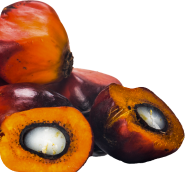
The Remarkable Importance of Palm Oil: A Versatile Industrial Input
The oil palm tree (Elaeis guineensis) has a wide variety of uses, and is the source of a large number of products which have become an essential part of the modern, global economy. Over recent decades it has emerged as a critical industrial input with many different applications due to its exceptional versatility, unique properties, and widespread availability.
This versatile vegetable oil is a critical ingredient in food, cosmetic, and personal care products, as well as industrial applications. Its high yield per hectare of cultivation makes it an efficient and cost-effective source of vegetable oil. In the food industry, palm oil is utilized in an extensive array of products, from baked goods and snacks to cooking oil and margarine, contributing to global food security.
Palm oil is also crucial to the cosmetics and personal care industry, being an essential component in soaps, shampoos, lotions, and makeup products. Industrial uses of palm oil also include biofuel production, where it is an important feedstock, and as an industrial lubricant.
The many industrial uses of palm kernel oil and its importance to the global economy mean that it is imperative that the palm oil industry maintains and increases supplies of sustainable palm oil.
Nutritional Benefits and Food Industry Applications
Palm oil is renowned for its nutritional composition, making it a vital ingredient in the food industry. It contains a balanced mix of saturated and unsaturated fats, providing a rich source of energy. Additionally, it is naturally free from trans fats and cholesterol, making it a healthier alternative to other edible oils. Trans fats are known for their negative impact on cardiovascular health, as they can raise levels of “bad” LDL cholesterol and lower “good” HDL cholesterol, thereby increasing the risk of heart diseases. It’s lack of trans fats, means that palm oil reduces these risks, contributing to a heart-friendlier dietary option.
Additionally, palm oil’s heat stability and neutral taste allow for widespread application in cooking oils, margarines, snacks, and bakery products, enhancing their texture, taste, and shelf life.
Versatility in Cosmetics and Personal Care Products
Palm oil is used extensively in the production of cosmetics and personal care items. Its unique combination of saturated and unsaturated fatty acids makes it an excellent emollient, providing moisture and promoting skin hydration. Furthermore, palm oil derivatives, such as glycerin and fatty alcohols, serve as essential ingredients in the formulation of soaps, shampoos, lotions, and creams, enhancing their texture and stability.

Industrial Applications and Biofuel Advancements
The industrial sector benefits significantly from palm oil due to its remarkable properties and versatility. Palm oil-based lubricants and greases are highly effective, offering superior lubrication and corrosion resistance, making them ideal for industrial machinery and automotive applications.
Furthermore, recent advancements in biofuel technology have positioned palm oil as a valuable feedstock for biodiesel production, reducing reliance on fossil fuels and contributing to a greener future. Its low viscosity and high energy content make palm oil feedstock so important. Palm oil biodiesel can also be blended with conventional diesel fuel. This is important to governments and industries seeking ways to address climate change and promote sustainable energy.
Sustainable Energy Generation
Oil palm processing is also key to renewable energy generation. It is used in the production of palm kernel shells, an abundant biomass residue, which is converted into biomass pellets or briquettes for electricity and heat generation. These renewable energy sources contribute to reducing greenhouse gas emissions, providing an eco-friendly solution to meet growing energy demands.
Economic Development and Job Creation
The palm oil industry, from cultivation to processing, creates substantial employment opportunities, particularly in developing countries. Its production is a vital source of income for millions of small-scale farmers, supporting rural economies and lifting communities out of poverty. Furthermore, the palm oil industry contributes to national economies through export earnings, foreign exchange, and investments in infrastructure development.
Palm oil’s significance as an industrial input cannot be overstated. Its versatile nature, nutritional benefits, and remarkable properties make it a crucial ingredient in various industries. From food manufacturing to cosmetics, industrial applications to renewable energy, palm oil serves as a vital component, enhancing products and driving economic development. However, it is essential to ensure sustainable and responsible palm oil production practices to mitigate environmental impacts and safeguard biodiversity.